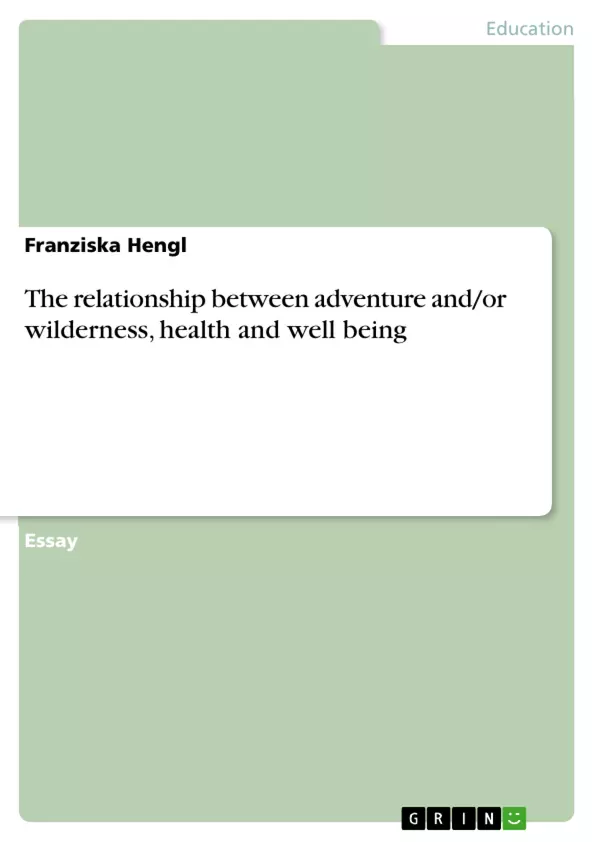The essay discusses the relationship between adventure and/or wilderness, health and well being.
It is labourious to overcome one`s weaker self. It is quite an investment to play sports, do activities or even to participate at an adventure. Humans in our modern time like comfort, security and idleness. In times of TV, insurance for everything, cars and elevators there is no need for effort and people get used to an idle lifestyle. Nevertheless, why should we participate in adventure or outdoor activities? Is there a positive relationship between participation in adventure activities and health or wellbeing? In the following I will define adventure, wellbeing and health, and discuss the advantages and disadvantages of adventure activities and their relation to wellbeing and health.
Inhaltsverzeichnis (Table of Contents)
- The relationship between adventure and/or wilderness, health and well being
- Defining adventure, wellbeing and health
- Stress aspect
- Nature aspect, recreation
- Diversification
- Developing skills, educational aspect
Zielsetzung und Themenschwerpunkte (Objectives and Key Themes)
This text explores the relationship between adventure activities and their impact on individual health and wellbeing. It aims to define the concepts of adventure, wellbeing, and health, and to examine the potential benefits and risks associated with participation in adventurous pursuits. The text focuses on the advantages and disadvantages of engaging in these activities, particularly in relation to physical, mental, and social wellbeing.
- The definition and nature of adventure activities
- The link between adventure and stress response
- The role of nature and recreation in adventure activities
- The impact of diversification and challenge on wellbeing
- The development of skills and personal growth through adventure activities
Zusammenfassung der Kapitel (Chapter Summaries)
- The relationship between adventure and/or wilderness, health and well being: This chapter introduces the topic of adventure activities and their potential benefits and risks in relation to health and wellbeing. It also provides definitions for adventure, wellbeing, and health.
- Defining adventure, wellbeing and health: This chapter provides definitions for adventure, wellbeing, and health based on established sources. It highlights the importance of understanding these concepts in the context of adventure activities.
- Stress aspect: This chapter discusses the role of stress and its management within adventure activities. It explains how the stress response can be activated and utilized during adventurous experiences, offering potential benefits for physical and mental health.
- Nature aspect, recreation: This chapter explores the importance of natural environments in adventure activities. It emphasizes the positive impact of nature exposure on health and wellbeing, citing research on the benefits of spending time in natural settings.
- Diversification: This chapter delves into the aspect of diversification and challenge within adventure activities. It examines how participating in unusual and unpredictable activities can contribute to individual growth and a sense of purpose.
- Developing skills, educational aspect: This chapter focuses on the educational and skill-building aspects of adventure activities. It highlights the role of adventure in enhancing physical and mental capabilities, promoting personal growth, and fostering a sense of accomplishment.
Schlüsselwörter (Keywords)
Adventure activities, health, wellbeing, stress, nature, recreation, diversification, challenge, skill development, personal growth, risk management, physical and mental wellbeing.
Frequently Asked Questions
Is there a link between adventure activities and wellbeing?
Yes, the essay discusses how engaging in outdoor and adventure activities can positively influence physical, mental, and social health.
How does adventure affect stress levels?
The text explains how the stress response activated during adventure can be beneficial when managed correctly, leading to personal growth and resilience.
What is the "nature aspect" of adventure?
It refers to the positive impact of being in natural environments, which research shows contributes significantly to recreation and individual health.
What are the disadvantages of an idle lifestyle?
Modern comforts like cars and elevators can lead to a lack of effort and physical activity, which may negatively impact long-term health and wellbeing.
What educational benefits do adventure activities provide?
They help in developing physical and mental skills, overcoming personal weaknesses, and fostering a sense of accomplishment and purpose.
- Citation du texte
- Franziska Hengl (Auteur), 2009, The relationship between adventure and/or wilderness, health and well being, Munich, GRIN Verlag, https://www.grin.com/document/164248



